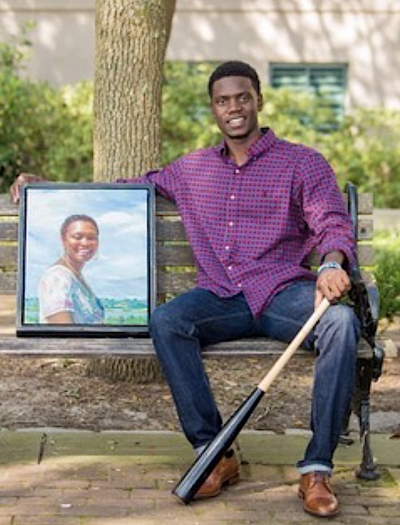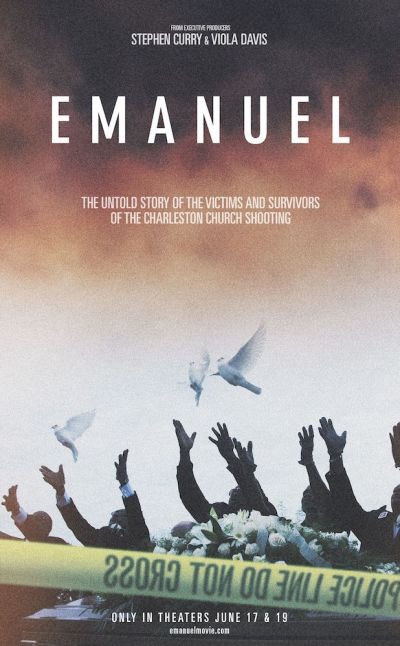Emanuel shooting victim's son says sharing how God had him forgive Dylann Roof is his life mission

Former professional baseball player Chris Singleton lost his mother in the tragic 2015 Emanuel AME Church shooting in Charleston, South Carolina and says he was able to forgive the killer and God has made it his life mission to share the story with others.
Singleton’s story is told in the upcoming documentary, “Emanuel,” which will hit theaters nationwide through Fathom Events on June 17 and 19. The movie shares the chilling testimonies of the victims of the 2015 Emanuel AME Church shooting in Charleston, South Carolina while giving viewers a look into the church's rich history.
The moving documentary is being released to coincide with the anniversary of the convicted shooter, 21-year-old white supremacist Dylann Roof, and his first court appearance where one by one Roof was forgiven by the family members of the nine people he shot dead in the basement of the historically black church in Charleston, S.C.

The documentary was made in direct partnership with the city of Charleston and the families affected by the tragedy. Among those whose lives would forever be changed the evening of June 17 was Singleton, whose mom, 45-year Sharonda Coleman-Singleton, was among the slain. The athlete's mother raised him in the historic black church, founded in 1816, which once served as a meeting place for those who marched for civil rights.
Below is an edited transcript between The Christian Post and former minor-league outfielder for the Chicago Cubs Singleton, where he shares on the power of forgiveness, why he left professional baseball and all that he’s doing in his mother’s memory now.
Christian Post: After everything that you’ve been through, how do you, a victim of the worst kind of racism, combat racism?
Singleton: To somebody that looks different than me, I'm going to be extra nice to them. I have no idea if they are racist or not but I think it's super hard for somebody that's racist to be mean to you if you're being super nice to them. I think by being super kind to somebody, you can change somebody's mind about people that look like you forever.
CP: How does one keep going after everything you’ve been through?
Singleton: In a sense, I'm never going to try to move on, there's always going to be a piece of me that's gone because of that. But I've used the incident, my mom's life being taken away the way it was, I've used that to kind of fuel me and my mission to spreading love and unity. So I guess in a way, I'm not really moving on from it, I'm using that as fire and fuel to keep doing what I'm doing.
CP: Talk to us about your choice to forgive your mother’s killer and the response that choice generated?
Singleton: I think first and foremost when people think you forgive, they automatically think you submitted and you're weak. I think that's the complete opposite of what forgiveness is. I think it takes more strength and more courage to forgive somebody than it does to hold a grudge and to be angry and upset all the time. I think that's the easy way out.
With me personally, I believe once we're able to forgive you are able to build on things and you're able to free yourself of that constant feeling of anxiety or feeling like you need to get revenge or whatever it may be. In my life, I'm a believer and I know for a fact that I had help when I said the words that I forgive him. I know now that it wasn't just me. I know that God was actually using me and my life during that time. At the time when I said it, I had no idea why I said it. People were saying, your mom was speaking through you. But now I realized that it was God using me in that time.
I've heard people saying that by forgiving you're taking the easy way out, you're not holding people accountable. People think that I'm okay with the way that things turned out and I'm not at all but that's what fuels me from stopping that from happening in the future
CP: Has Dylan Roof responded to your act of forgiveness?
Singleton: I haven't seen any response or reaction from him in any way.
CP: How is your relationship with the surviving members and victims?
Singleton: As far as other family members, now that I'm back in Charleston, I've been able to meet up with them and hang out a little bit. Being around people that have gone through this as well, definitely helps us in our grieving process.
CP: The Bible says all things work together for God to those who love God ..., would you say that you’ve seen good come out of this tragedy?
Singleton: There's so many different things that I can tell you about the good that's come from the power of forgiveness. I was speaking about it and this girl came up to me, and she just talked about things that happened in her life and how she felt she'd never be able to forgive her parents or her dad especially, for what happened to her. She said to me, “I don't know if I'll be able to forgive as quickly as you did but I do know for a fact that hearing you speak and seeing what you've gone through and now you're the other side of it. I know that forgiveness is the way.
CP: Why did you decide to not continue your baseball career?
Singleton: There's a multitude of reasons, but first and foremost, I know that once this happened to me in my life and once I started to share my story, I knew that this is what God had called me to do.
If that was doing baseball, great, if it wasn't through baseball that's fine just as well. It wasn't really a tough decision for me because I know that baseball wasn't just who I am anymore, after what happened to me, I knew that God had different plans for my life.
CP: What would your mom want people to take away from everything that’s happened and this movie?
Singleton: Well, first and foremost, I think my mom was super funny and I guess she would probably want people to know that she was extremely well dressed, she was God-fearing and she's such a faithful woman. I know she would want people to come to Jesus after watching this film. If that happens, whether it's just one person or a ton people, I know she'd be ecstatic about it, I know she would absolutely love that.
CP: What do you want the message of the movie to be to all who watch it?
Singleton: The power of forgiveness is real. I think people will definitely see that in the film. I think people will see that forgiveness is the way and hopefully, they will believe that as well, after watching. I also think that they're going to realize that there's a higher power involved in the whole thing. It wasn't just people saying words. I think that God literally had his hands on what happened, the aftermath and how we all came together. I think that was God bringing us closer together. So I hope people can see that in the movie as well.
CP: You have since started a foundation, tell us about it?
Singleton: My foundation, basically what it does is it allows me to go speak at schools all across the country that need to hear my message. In a perfect world, every school will have funding for people to come in and share their testimony to inspire and unite different kids but in reality, that's not the case.
So when a school says "Chris, we want to have you at our school we just don't have the budget," they won't have to worry about that. I'll be able to come and share my story, my message, without them worrying about a fee or a cost.
“Emanuel,” hits theaters nationwide through Fathom Events on June 17 and 19. Profits from the film will be shared with the survivors of the shooting and the families of the victims.
For more information on Singleton’s foundation, visit his website.




























